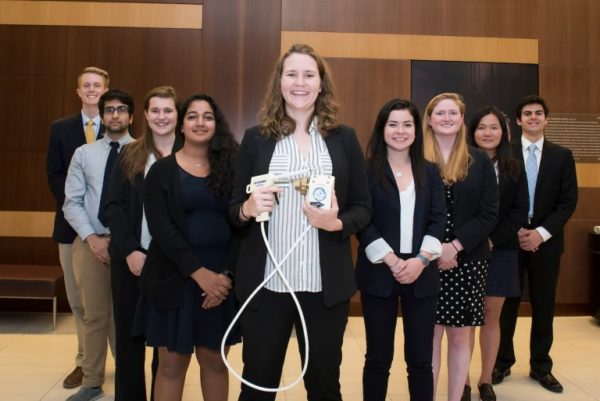Hopkins BME students take top prizes at annual JHU Business Plan Competition

Three Johns Hopkins biomedical engineering teams won top prizes at the 19th annual Johns Hopkins University Business Plan Competition in a day-long event Friday that capped months of preparation and prototyping.
More than 45 judges, many of them Johns Hopkins alumni, evaluated the teams’ business plans and winnowed them down from more than 50 entries to 27 finalists who competed for more than $55,000 in prize money.
Leslie Silverglide, WSE ’02, co-founder and CEO of Mixt, a quick-service restaurant chain in California, opened the program with a keynote address in Charles Commons. She encouraged students to seek out mentors and take advantage of interesting internship opportunities.
“Every day, you will have a new set of problems,” she told the packed room. “And you have to take them one at a time.”
The students went on to pitch their ideas, including a concert truck to deliver high-quality classical music, an online platform to help college students chart their academic goals, and a personalized approach to treating type 2 diabetes.
“This is our signature event,” said Pam Sheff, Director of the Whiting School of Engineering’s Center for Leadership Education. “These students have been working for nearly a year, developing their pitches and trying to build their companies. It’s serious business. Some of these companies are going to go live… And even for those that don’t, these students are building skills that will take them wonderful places in the future.”
In the end, biomedical engineering teams took top prizes in two of the four main categories: mobile application, medical technology & life sciences, social enterprise, and general business. First-place teams received $6,000, second-place teams got $4,000, and third-place teams won $2,500.
Medical Technology & Life Sciences:
Team Pneumonix Medical placed first in the Medical Technology & Life Sciences category for its medical device that helps prevent the risk of lung collapse during CT-guided biopsy. Team members include Andrew Eisenthal, Shashwat Gupta, Sabrina Liu, Edward Ruppel, and Wade Schutte.
Social Enterprise:
Team Kubanda Cryotherapy earned first place in the Social Enterprise category for its work to create an affordable and locally available breast cancer treatment method for women living in low-resource areas around the world. The team’s device uses carbon dioxide gas as a cryogen to kill tumor cells in a minimally invasive procedure. Team members include current and former BME students Pascal Acree, Tara Blair, Yixin Hu, Grace Kuroki, Evelyn McChesney, Shivam Rastogi, Bailey Surtees, and Serena Thomas.
Team Ithemba placed second in this category for its cost-effective core needle biopsy device, which eliminates contamination risk and expands access to breast cancer diagnosis worldwide. Team members include Megan Callanan, Valerie Zawicki, Sophia Triantis, Laura Hinson, and Madeline Lee.
To learn about the winning teams in other categories, please visit The Hub.
